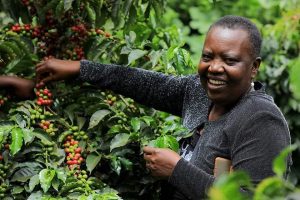In Kiganjo Mathari, coffee farming is not just a crop business—it’s a lifeline. Yet, women, who make up a significant portion of the agricultural workforce, often remain in the shadows.

Gakuru Junior, a forward-thinking MCA candidate for 2027, is rewriting this story by putting women at the heart of agricultural transformation.
His vision? A Kiganjo Mathari where women coffee farmers are empowered economically, socially, and politically.
With a mission rooted in equity, opportunity, and innovation, Gakuru Junior believes that empowering women in the coffee sector will uplift entire households and stimulate local economic growth.
This article explores 10 best ways Gakuru Junior plans to empower women coffee farmers and usher in a new era of sustainable development in the ward.
Empowering Women Coffee Farmers: Gakuru Junior’s Vision for Kiganjo Mathari 2027
1. Establishing Women’s Coffee Cooperatives
One of Gakuru Junior’s primary strategies is the formation of exclusive women-led coffee cooperatives. These groups will serve as platforms for shared learning, market access, and financial empowerment.
When women work together, they gain a stronger bargaining voice, fairer prices, and collective confidence. Gakuru Junior envisions cooperatives where women not only grow coffee but also process, brand, and sell it.
Positive Impact: Increased income, leadership development, and local economic stimulation.
2. Providing Access to Affordable Farm Inputs
Many women in Kiganjo Mathari lack the financial ability to buy quality seeds, fertilizers, and equipment. Gakuru Junior plans to launch input subsidy programs tailored specifically for women coffee farmers.
By lowering production costs, these women will increase yields and profits. Gakuru Junior will work with government and private sector partners to make this vision a reality.
Positive Impact: Better yields, healthier crops, and reduced poverty levels.
3. Coffee Farming Training and Extension Services
Education is power. Gakuru Junior will introduce training workshops and demo farms focusing on modern coffee farming techniques and climate-smart practices—designed specifically for women.
By empowering women with knowledge, they can improve farm productivity, handle pests, and adopt organic practices. Field officers will also be deployed to offer door-to-door extension services.
Positive Impact: Improved productivity, environmental sustainability, and farm resilience.
4. Supporting Access to Land and Ownership Rights
Land ownership remains a major barrier for many women farmers. Gakuru Junior will advocate for equitable land rights, pushing for policies that ensure women can inherit, lease, or buy land for coffee farming.
This shift will give women the autonomy to make long-term investments in their farms without fear of displacement.
Positive Impact: Land security, independence, and stronger family economies.
5. Facilitating Access to Coffee Markets
Gakuru Junior is committed to linking women coffee farmers to both local and international markets. He will create a ward-based digital market platform to connect farmers with buyers and cooperatives.
Additionally, he plans to host annual Kiganjo Mathari Women Coffee Expo events to showcase their produce and attract export partners.
Positive Impact: Better prices, market visibility, and global exposure.
6. Offering Women-Friendly Financial Services
Traditional financial systems often lock women out due to collateral demands. Gakuru Junior will partner with SACCOs and microfinance institutions to provide low-interest, collateral-free loans and savings plans designed for women.
He also plans to establish a Women Farmers’ Empowerment Fund, funded through partnerships and county support.
Positive Impact: Access to credit, capital for expansion, and financial independence.
7. Promoting Coffee Value Addition by Women
Why sell raw coffee beans when you can sell branded Kiganjo Mathari coffee? Gakuru Junior’s plan includes training women in value addition such as roasting, packaging, and branding.
He envisions small-scale processing units run by women groups that will increase income and provide employment.
Positive Impact: Job creation, brand recognition, and increased profit margins.
8. Building Childcare Centers Near Coffee Farms
Many women forgo working on the farm because of childcare duties. To address this, Gakuru Junior plans to pilot childcare support centers near major farming zones.
These centers will provide safe spaces for children while their mothers farm—ensuring productivity without compromising care.
Positive Impact: Work-life balance, higher participation, and empowered mothers.
9. Recognizing Women in Agriculture Awards
Motivation is key. Gakuru Junior intends to start an annual “Women in Coffee Leadership Awards” in Kiganjo Mathari to celebrate outstanding women farmers and cooperatives.
The awards will foster healthy competition, leadership, and pride in farming.
Positive Impact: Recognition, morale boost, and community inspiration.
10. Appointing Women in Agricultural Leadership Boards
Change starts from the top. Gakuru Junior pledges to appoint women to key agricultural boards and decision-making roles within the ward.
This will ensure policies reflect the needs of women farmers and encourage girls to dream big.
Positive Impact: Representation, policy change, and lasting empowerment.
Empowering Women Coffee Farmers – Gakuru Junior’s Vision FAQs
1. Why is Gakuru Junior focusing on women in coffee farming?
Because women are the backbone of agriculture in Kiganjo Mathari and empowering them fuels household and community development.
2. How will women benefit financially from this vision?
They will access subsidized inputs, direct markets, loans, and value addition—leading to higher profits.
3. Will there be training for women farmers?
Yes, Gakuru Junior plans practical training, demo farms, and field extension services.
4. What support is available for landless women?
He advocates for land rights and easier leasing options for women farmers.
5. How will Gakuru help market the coffee?
Through local expos, digital platforms, and linking to international buyers.
6. What role will women play in decision-making?
Gakuru Junior plans to place women in agricultural boards and leadership structures.
7. Are these plans only for large-scale women farmers?
No, even small-scale women coffee growers will benefit under this inclusive plan.
Conclusion
Empowering women coffee farmers is not just a campaign promise—it’s the heart of Gakuru Junior’s vision for Kiganjo Mathari Ward.
Through access to land, markets, finance, and training, he aims to ensure that every woman who grows coffee grows wealth, dignity, and influence. This bold and inclusive plan shows that the future of agriculture in the ward is female-led and community-driven.
Let us rally behind a vision that plants more than just coffee—it plants hope, equity, and opportunity. With Gakuru Junior 2027, the women of Kiganjo Mathari have a strong and trusted champion
Recent Posts
The President of the United States exercised his war powers this weekend by ordering a major military strike against Iran without formal authorization from Congress, escalating a longstanding...
Trump Bypasses Congress on Iran Strike, Prompting Fierce War Powers Vote Demands in Washington
Washington D.C., March 1, 2026 — A major constitutional and political crisis unfolded in the U.S. capital today after President Donald Trump authorized a large‑scale military strike against Iran...